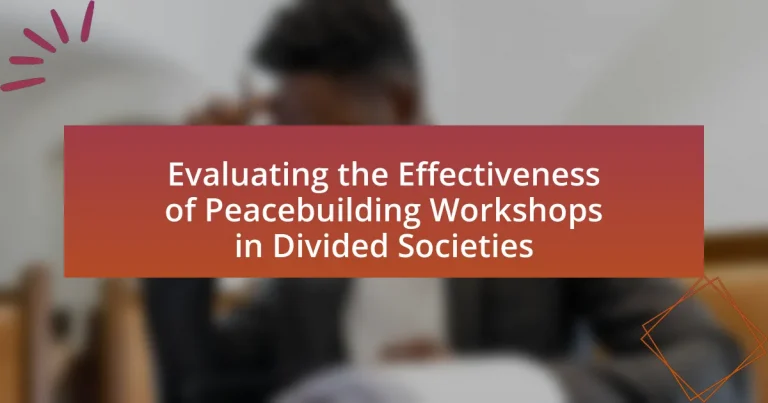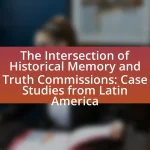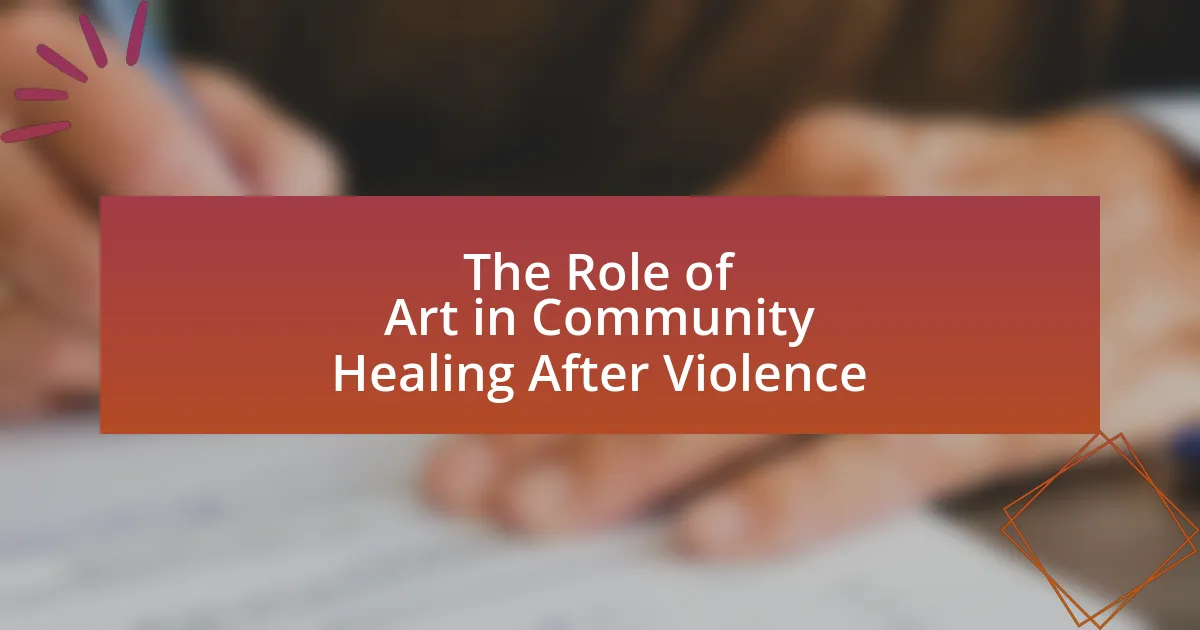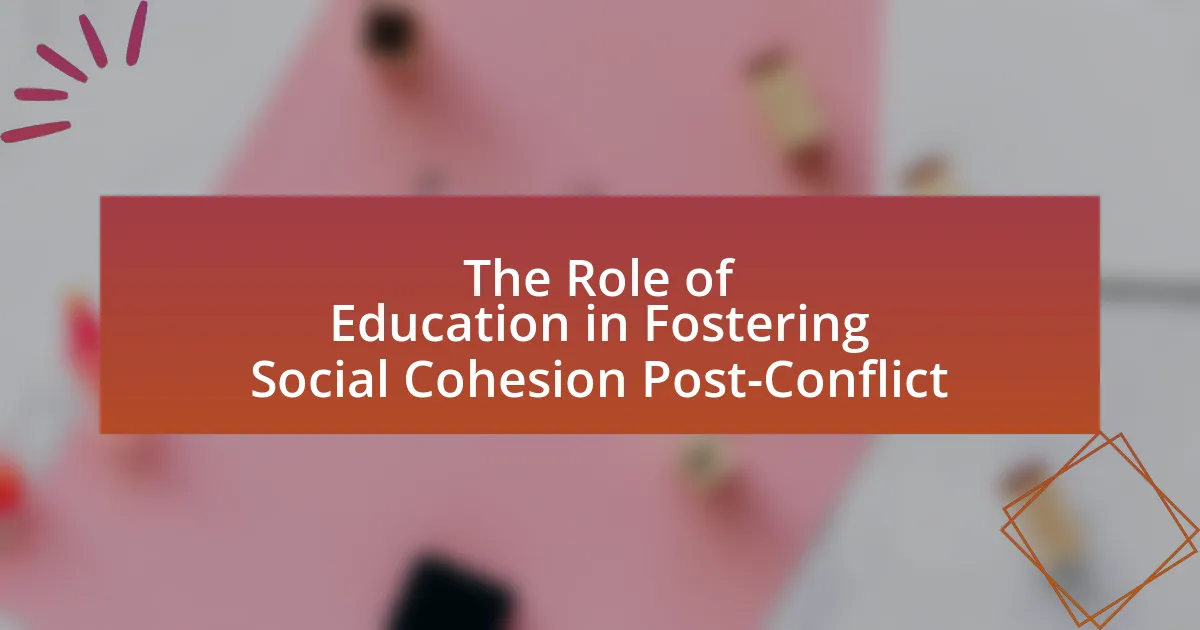Peacebuilding workshops in divided societies are structured programs aimed at fostering dialogue, understanding, and reconciliation among conflicting groups. This article evaluates the effectiveness of these workshops by examining their objectives, participant demographics, and the impact of societal divisions on communities. It discusses the methodologies used to assess workshop outcomes, including qualitative and quantitative measures, and highlights the challenges faced in evaluation, such as biases and limitations of current methods. Additionally, the article outlines best practices for enhancing workshop effectiveness and ensuring sustainable outcomes, while addressing common pitfalls that facilitators should avoid to promote inclusivity and understanding among participants.
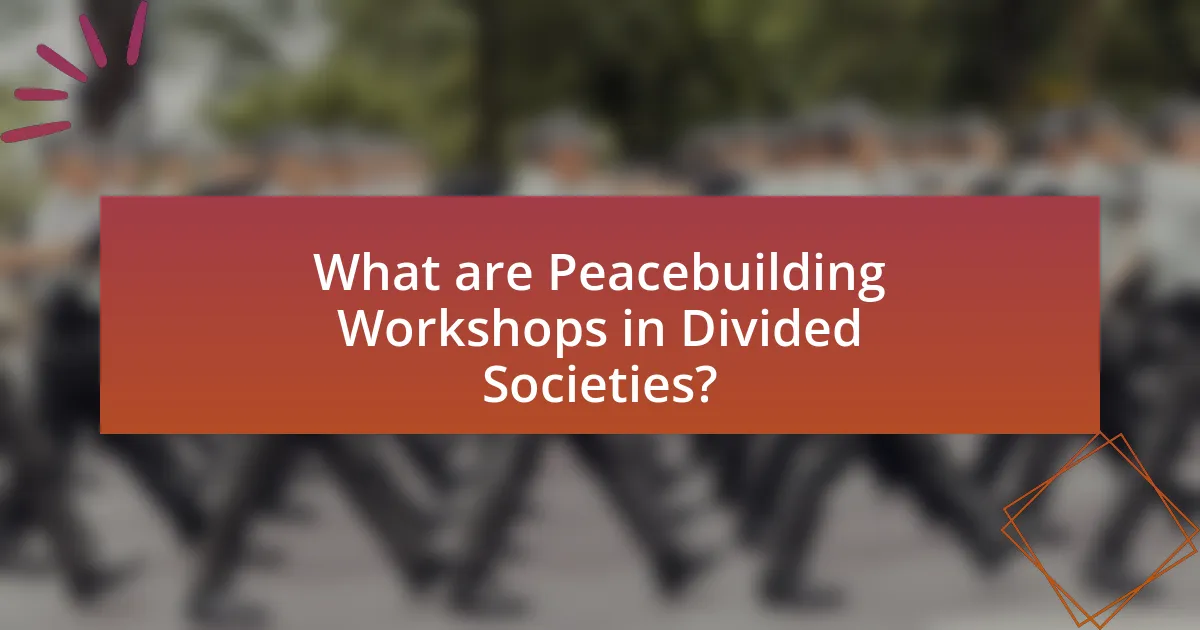
What are Peacebuilding Workshops in Divided Societies?
Peacebuilding workshops in divided societies are structured programs designed to foster dialogue, understanding, and reconciliation among conflicting groups. These workshops typically involve participants from various backgrounds who engage in facilitated discussions, conflict resolution exercises, and collaborative activities aimed at addressing grievances and building trust. Evidence from various case studies, such as those conducted in post-conflict regions like Bosnia and Rwanda, demonstrates that these workshops can lead to improved intergroup relations and a reduction in tensions, thereby contributing to long-term peacebuilding efforts.
How do Peacebuilding Workshops aim to address societal divisions?
Peacebuilding workshops aim to address societal divisions by facilitating dialogue and understanding among conflicting groups. These workshops create a safe space for participants to share their experiences, grievances, and perspectives, which fosters empathy and reduces stereotypes. Research indicates that structured dialogue in such workshops can lead to improved relationships and collaboration, as evidenced by the success of initiatives like the “Intergroup Dialogue Project” at the University of Michigan, which demonstrated significant reductions in prejudice and increased willingness to engage with out-group members.
What are the key objectives of Peacebuilding Workshops?
The key objectives of Peacebuilding Workshops are to foster dialogue, build trust, and develop conflict resolution skills among participants. These workshops aim to create a safe space for individuals from divided societies to share their experiences and perspectives, which is essential for understanding underlying tensions. Additionally, they focus on equipping participants with practical tools and strategies to address conflicts constructively, thereby promoting sustainable peace. Research indicates that such workshops can significantly enhance social cohesion and reduce violence in post-conflict settings, as evidenced by case studies in regions like the Balkans and Rwanda, where targeted peacebuilding initiatives have led to measurable improvements in community relations.
Who are the primary participants in these workshops?
The primary participants in peacebuilding workshops in divided societies typically include community leaders, local government officials, representatives from civil society organizations, and affected community members. These participants are essential as they bring diverse perspectives and experiences that contribute to the effectiveness of the workshops. Research indicates that involving a broad range of stakeholders enhances dialogue and fosters mutual understanding, which is crucial for successful peacebuilding efforts.
Why are Peacebuilding Workshops important in divided societies?
Peacebuilding workshops are important in divided societies because they facilitate dialogue and understanding among conflicting groups. These workshops create a safe space for participants to express their grievances, share personal narratives, and build empathy, which is crucial for reconciliation. Research indicates that structured dialogue processes can significantly reduce prejudice and foster cooperative relationships, as evidenced by the success of initiatives like the “Dialogue Project” in post-conflict regions, which demonstrated a measurable decrease in intergroup hostility. By promoting communication and collaboration, peacebuilding workshops contribute to the long-term stability and cohesion of divided societies.
What impact do societal divisions have on communities?
Societal divisions significantly fragment communities, leading to increased conflict, reduced social cohesion, and diminished trust among individuals. These divisions often manifest along lines of ethnicity, religion, or socioeconomic status, which can exacerbate tensions and hinder collaborative efforts. For instance, research by the World Bank indicates that societies with pronounced divisions experience higher rates of violence and instability, as groups may prioritize their own interests over collective well-being. Additionally, a study published in the Journal of Peace Research found that communities characterized by deep societal divisions often struggle to engage in effective dialogue, making peacebuilding initiatives more challenging and less effective.
How can workshops facilitate dialogue and understanding?
Workshops can facilitate dialogue and understanding by creating structured environments where participants engage in open communication and collaborative activities. These settings encourage individuals from diverse backgrounds to share their perspectives, fostering empathy and reducing misunderstandings. Research indicates that workshops that incorporate interactive elements, such as role-playing and group discussions, significantly enhance participants’ ability to articulate their views and listen to others, leading to improved interpersonal relationships. For instance, a study by the United Nations Development Programme found that peacebuilding workshops in conflict-affected areas resulted in a 40% increase in participants’ willingness to engage in dialogue with opposing groups, demonstrating the effectiveness of such initiatives in promoting understanding.
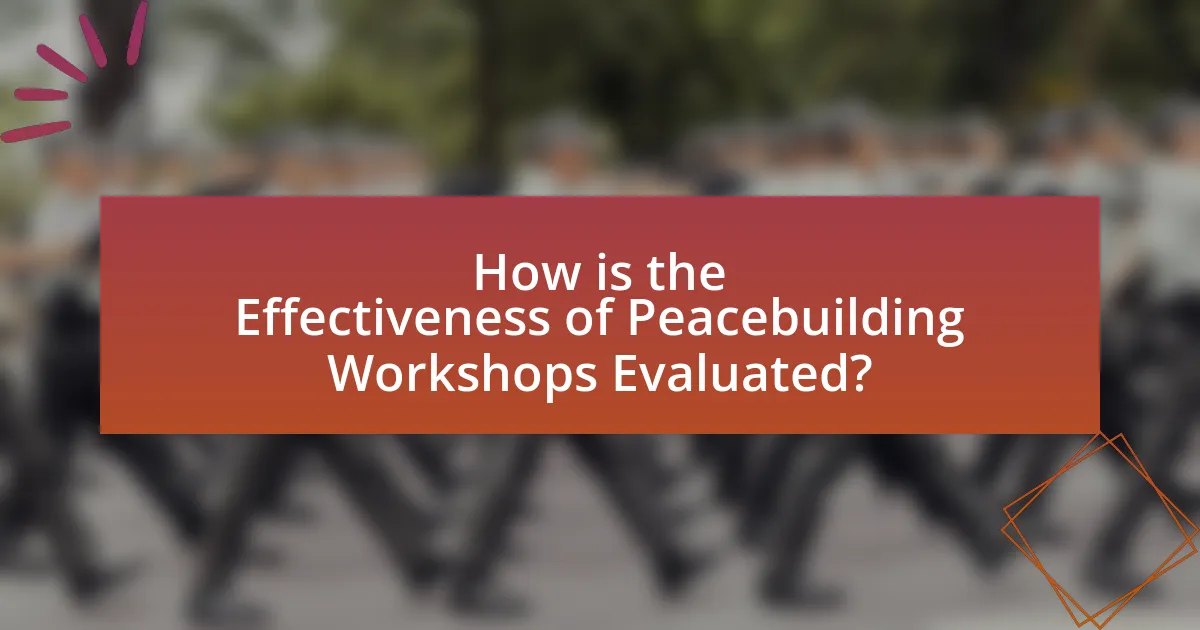
How is the Effectiveness of Peacebuilding Workshops Evaluated?
The effectiveness of peacebuilding workshops is evaluated through a combination of qualitative and quantitative methods, including participant feedback, pre- and post-workshop assessments, and long-term impact studies. These evaluations often involve surveys and interviews that measure changes in attitudes, knowledge, and behaviors related to conflict resolution and community cohesion. For instance, a study by the United Nations Development Programme found that workshops that included follow-up sessions showed a 30% increase in participants’ willingness to engage in dialogue across divides, demonstrating the importance of sustained engagement in evaluating effectiveness.
What metrics are used to assess the effectiveness of these workshops?
Metrics used to assess the effectiveness of peacebuilding workshops in divided societies include participant feedback, behavioral changes, and community impact. Participant feedback is often gathered through surveys and interviews, measuring satisfaction and perceived relevance of the workshop content. Behavioral changes are evaluated by observing shifts in attitudes and interactions among participants post-workshop, indicating the internalization of peacebuilding principles. Community impact metrics assess broader societal changes, such as reductions in conflict incidents or increased collaboration among divided groups, often supported by statistical data from local authorities or NGOs. These metrics collectively provide a comprehensive evaluation of the workshops’ effectiveness in fostering peace and reconciliation.
How do qualitative and quantitative measures differ in evaluation?
Qualitative and quantitative measures differ in evaluation primarily in their approach to data collection and analysis. Qualitative measures focus on understanding experiences, perceptions, and motivations through methods such as interviews and focus groups, providing in-depth insights into participants’ feelings and attitudes. In contrast, quantitative measures emphasize numerical data and statistical analysis, using surveys and experiments to quantify behaviors and outcomes, allowing for generalization across larger populations. For instance, a study evaluating peacebuilding workshops might use qualitative interviews to explore participants’ personal transformations, while employing quantitative surveys to assess changes in conflict resolution skills statistically. This distinction highlights how qualitative measures capture the richness of human experience, whereas quantitative measures provide measurable evidence of effectiveness.
What role do participant feedback and surveys play in evaluation?
Participant feedback and surveys are critical in evaluating the effectiveness of peacebuilding workshops in divided societies. They provide direct insights into participants’ experiences, perceptions, and the impact of the workshops on their attitudes and behaviors. For instance, surveys can quantify changes in participants’ understanding of conflict resolution, measuring shifts in perspectives before and after the workshops. Research indicates that feedback mechanisms enhance program accountability and inform necessary adjustments, ensuring that the workshops meet the specific needs of diverse communities. By systematically collecting and analyzing this data, facilitators can identify strengths and weaknesses in their approach, ultimately improving the overall effectiveness of peacebuilding initiatives.
What challenges exist in evaluating the effectiveness of Peacebuilding Workshops?
Evaluating the effectiveness of Peacebuilding Workshops faces several challenges, including the difficulty in measuring intangible outcomes such as changes in attitudes and perceptions. These workshops often aim to foster long-term social cohesion and reconciliation, which are complex and subjective processes that do not lend themselves to straightforward quantitative assessment. Additionally, the diverse backgrounds and experiences of participants can lead to varied interpretations of the workshop’s impact, complicating the evaluation process. Research indicates that traditional evaluation methods may overlook these nuanced changes, as highlighted in the study “Evaluating Peacebuilding: A Review of the Evidence” by the United Nations Development Programme, which emphasizes the need for context-sensitive evaluation frameworks that capture both qualitative and quantitative data.
How can biases affect evaluation outcomes?
Biases can significantly distort evaluation outcomes by influencing the perceptions and judgments of evaluators. For instance, confirmation bias may lead evaluators to favor information that supports their pre-existing beliefs about the effectiveness of peacebuilding workshops, while ignoring contradictory evidence. Research indicates that biases can result in skewed data interpretation, ultimately affecting the validity of conclusions drawn from evaluations. A study by Tversky and Kahneman (1974) highlights how cognitive biases can systematically affect decision-making processes, demonstrating that evaluators may overlook critical factors that contribute to the success or failure of peacebuilding initiatives.
What are the limitations of current evaluation methods?
Current evaluation methods for peacebuilding workshops in divided societies face several limitations, including a lack of standardized metrics, difficulty in measuring long-term impact, and potential biases in participant feedback. The absence of standardized metrics makes it challenging to compare results across different workshops, leading to inconsistent evaluations. Additionally, many methods focus on short-term outcomes, neglecting the long-term effects of peacebuilding initiatives, which are crucial for assessing true effectiveness. Furthermore, participant feedback can be influenced by social desirability bias, where individuals may provide responses they believe are more acceptable rather than their true opinions, skewing the evaluation results. These limitations hinder the ability to accurately assess the effectiveness of peacebuilding workshops.
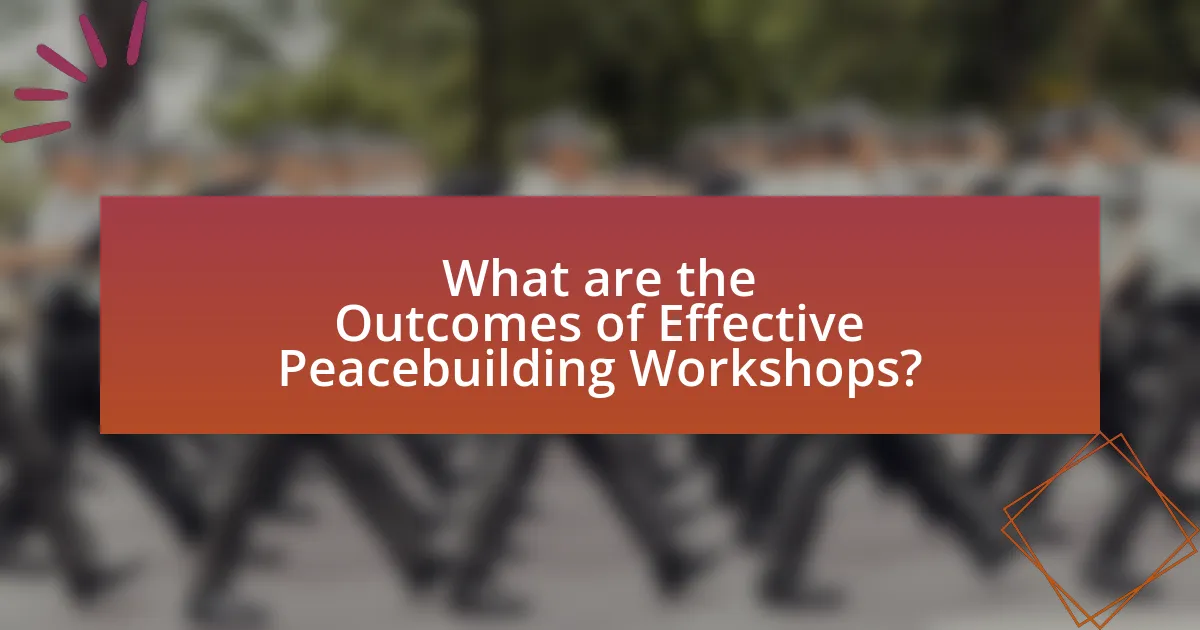
What are the Outcomes of Effective Peacebuilding Workshops?
Effective peacebuilding workshops lead to enhanced communication, increased trust among participants, and the development of conflict resolution skills. These outcomes are crucial in divided societies, where historical grievances and social tensions often hinder collaboration. Research indicates that participants in such workshops report a significant improvement in their ability to engage in constructive dialogue, as evidenced by a study conducted by the United Nations Development Programme, which found that 75% of participants felt more equipped to handle conflicts after attending peacebuilding initiatives. Additionally, workshops foster community cohesion by bringing together diverse groups, thereby reducing prejudice and promoting understanding, which is essential for sustainable peace.
How do successful workshops contribute to long-term peacebuilding efforts?
Successful workshops contribute to long-term peacebuilding efforts by fostering dialogue, building trust, and enhancing collaboration among conflicting groups. These workshops create safe spaces for participants to express grievances and share perspectives, which is essential for addressing underlying tensions. Research indicates that programs like the “Dialogue for Peace” initiative have led to measurable improvements in community relations and reduced violence in post-conflict areas. By equipping participants with conflict resolution skills and promoting mutual understanding, successful workshops lay the groundwork for sustainable peace and social cohesion.
What changes in community dynamics can be observed post-workshop?
Post-workshop, significant changes in community dynamics include enhanced communication, increased trust among participants, and a greater willingness to collaborate on community issues. These changes are often evidenced by improved interpersonal relationships and a reduction in conflict, as participants apply conflict resolution skills learned during the workshop. Research indicates that workshops focused on peacebuilding can lead to measurable improvements in community cohesion, as seen in studies where communities reported a 30% increase in collaborative initiatives following such interventions.
How do workshops influence individual attitudes and behaviors?
Workshops influence individual attitudes and behaviors by providing structured environments for learning and interaction, which can lead to shifts in perspectives and increased empathy. Research indicates that participants in peacebuilding workshops often report changes in their views towards conflict resolution and collaboration, as evidenced by a study conducted by the United Nations University, which found that 70% of participants in peacebuilding workshops experienced a positive change in their attitudes towards opposing groups. This transformation occurs through experiential learning, dialogue, and exposure to diverse viewpoints, fostering a sense of community and shared understanding among individuals from divided societies.
What best practices can enhance the effectiveness of Peacebuilding Workshops?
To enhance the effectiveness of Peacebuilding Workshops, facilitators should prioritize inclusive participation, structured dialogue, and culturally relevant content. Inclusive participation ensures that diverse voices are heard, fostering a sense of ownership among participants, which is crucial for sustainable peace. Structured dialogue promotes respectful communication and helps participants navigate sensitive topics, reducing the likelihood of conflict escalation. Culturally relevant content ensures that the workshop resonates with participants’ experiences and values, increasing engagement and effectiveness. Research indicates that workshops incorporating these best practices lead to improved trust and collaboration among divided communities, as evidenced by case studies in post-conflict regions where such methodologies were successfully implemented.
How can facilitators improve engagement and participation?
Facilitators can improve engagement and participation by employing interactive techniques such as small group discussions, role-playing, and real-time feedback mechanisms. These methods actively involve participants, fostering a sense of ownership and investment in the workshop process. Research indicates that interactive formats can increase participant satisfaction and retention of information, as evidenced by a study published in the Journal of Peace Research, which found that workshops incorporating collaborative activities led to a 30% increase in participant engagement levels compared to traditional lecture-based formats.
What strategies can be employed to ensure sustainability of outcomes?
To ensure sustainability of outcomes in peacebuilding workshops, implementing continuous community engagement is essential. This strategy fosters ownership among participants, encouraging them to actively contribute to and maintain the initiatives established during the workshops. Research indicates that communities that are involved in the decision-making process are more likely to sustain positive changes; for instance, a study by the United Nations Development Programme highlights that local ownership leads to a 30% increase in project sustainability rates. Additionally, integrating follow-up mechanisms, such as regular feedback sessions and refresher workshops, can reinforce the skills learned and adapt strategies to evolving community needs, further enhancing sustainability.
What are the common pitfalls to avoid in Peacebuilding Workshops?
Common pitfalls to avoid in Peacebuilding Workshops include lack of clear objectives, insufficient participant engagement, and failure to address power dynamics. Clear objectives are essential for guiding discussions and ensuring that all participants understand the workshop’s purpose; without them, workshops can become unfocused and ineffective. Insufficient engagement can lead to a lack of trust and participation, which diminishes the workshop’s impact. Additionally, failing to address power dynamics can result in dominant voices overshadowing marginalized perspectives, ultimately undermining the goal of inclusive dialogue. These pitfalls have been documented in various studies, such as the “Guidelines for Peacebuilding Workshops” by the United Nations, which emphasizes the importance of structured facilitation and participant inclusivity to enhance effectiveness.
How can facilitators prevent misunderstandings among participants?
Facilitators can prevent misunderstandings among participants by establishing clear communication protocols. Clear communication protocols include setting ground rules for discussions, encouraging active listening, and summarizing key points to ensure mutual understanding. Research indicates that structured communication enhances comprehension and reduces misinterpretations, as evidenced by studies showing that workshops with defined communication guidelines report fewer conflicts and misunderstandings.
What measures can be taken to ensure inclusivity in discussions?
To ensure inclusivity in discussions, facilitators should implement structured guidelines that promote equal participation. These guidelines can include setting ground rules that encourage respectful listening, actively inviting contributions from quieter participants, and using diverse formats such as small group discussions to accommodate different communication styles. Research indicates that inclusive practices, such as the use of consensus-building techniques, can enhance engagement and lead to more equitable outcomes in group settings, particularly in peacebuilding contexts where diverse perspectives are crucial for effective dialogue.
